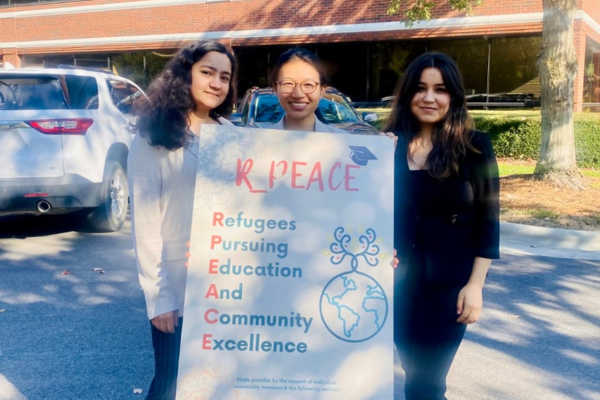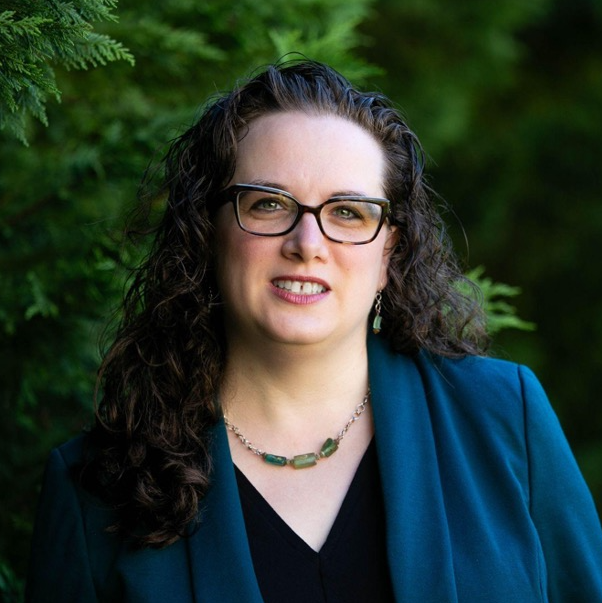By: Jennifer C. Mann
This is the first post in a the Refugee Youth Voices series that is uplifting the voices of young people with refugee- and immigrant-backgrounds.
Highlights:
- This post is introducing the Refugee Youth Voices blog series with the Refugees Pursuing Education And Community Excellence (R_PEACE) coalition.
- I present information about the students from refugee backgrounds and the inequitable systems they face.
- I introduce the work and impact of R_PEACE and set the stage for upcoming student-written blogs in this series. Additionally, I provide resources for learning more.

I spent sixteen years as an educator, mostly to refugee- and immigrant-background students who recently arrived in the United States. I am currently a Research Scientist at Duke University, where I work on making education more accessible and more welcoming for such students.
Refugee Backgrounds & Inequitable Systems
Refugees relocate to escape violence, poverty, and extreme conditions. They also arrive in new countries hoping for educational opportunities. However, despite their interest in educational achievement, there are many reasons refugees face educational barriers.
First, the process of migration for refugees often involves emotional trauma and may result in post-traumatic stress disorder.1 Additionally, there are often gaps in children’s formal education before and during the resettlement process.2 Students with limited or interrupted formal education have had at least two fewer years of schooling than their peers and have varying levels of formal education.3
Furthermore, refugee-background students often face mixed reception by community and school personnel.4 Overall, there is evidence of a continued deficit perspective held by teachers and administrators towards refugee and immigrant students and a subsequent lack of access to rigorous learning opportunities.5
In response to the lack of rigorous learning, I wanted to provide refugee-background youth with opportunities for complex learning and critical engagement. One important research project I led was a social design-based experiment, which was conducted in an effort to bring about social transformation through a reconceptualization and reorganization of standard educational practices. Central to social design-based research is inviting participants to partner in taking action to help transform the inequitable systems which adversely impact their lives. In this social design-based study, I worked with a group of young adults from refugee backgrounds who wanted to increase college access for other refugee-background students.
They formed a coalition called R_PEACE (Refugees Pursuing Education And Community Excellence). Through R_PEACE they traveled around to nonprofits who work with refugee- and immigrant-background students and shared some of their educational experiences and insights and offered their support. Additionally, R_PEACE spoke to over a hundred educators about how they can better support their students who are new to the country or new to the language.
The Coalition’s Work & Impact
The R_PEACE students have incredible insight into the unique complexities of being refugees. Driven by a motivation to help, they are able to:
- Clearly communicate their own experiences.
- Challenge others to consider how they can help craft better educational experiences for other refugee-background students.
- Create better experiences and better futures for others.
- Openly share their own difficult experiences.
It is my hope that we can all be open to hearing and learning from them. In the upcoming series blogs, Sue Mar, Gigi, and other students share profound insights that are relevant to us all as we seek to make the world a better place.
As educators, we can improve the world by making strides towards cultivating spaces of belonging. As researchers, we can seek out humanizing and participatory research approaches which allow the participants to partner with us in seeking solutions to the problems they face. As both an educator and a researcher, one of the most important actions I can take is listening to learn. It is my hope that we will each pause in our busy lives and listen to learn from the wisdom of others.
Resources for Learning More
In addition to listening to learn, we can read to learn. I’ve included some resources for those wanting to know more. Learn more about teaching refugees from the United Nations High Commissioner for Refugees (UNHCR), the world’s leading refugee organization. Visit Harvard’s page on research, education, and action for refugees around the world for academic and creative resources. Finally, read an article I wrote about the importance of caring relationships and relevant and relatable curriculum.
Citations
1Tuliao et al., 2017; 2Daniel & Zybina, 2019; 3Hos, 2016; 4Roxas & Roy, 2012, p. 469; 5Alford, 2014; Daniel & Zybina, 2019; Lau, 2012
If you have any comments or questions about this post, please email Youth-Nex@virginia.edu. Please visit the Youth-Nex Homepage for up to date information about the work happening at the center.

Author Bio: Jennifer C. Mann is a Research Scientist at Duke University’s Center for Child and Family Policy. In 2023, she received her Ph.D. in Teacher Education and Learning Sciences from North Carolina State University. Dr. Mann spent sixteen years as an educator, teaching high school English, elementary and adult English as a Second Language (ESL), and undergraduate pre-service English and ESL education. Her research interests include refugee and immigrant education, culturally sustaining critical pedagogies, and the social-emotional well-being of marginalized students.
